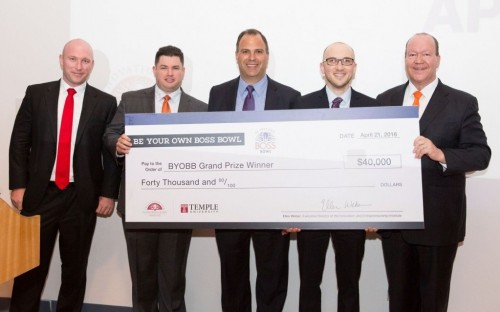Traditionally, leadership has been more subjective. While big data analytics has transformed the finance and marketing departments of many top firms, professionals in Human Resources (HR) have been slow to adapt.
But that’s set to change. In late 2014, Tony Petrucci, a veteran business leader and leadership professor at Temple University’s Fox School of Business, co-founded the cutting-edge Leadership Analytics Group with two of his colleagues. In February this year, it launched its flagship product: the DevelapMe app.
In both the workplace and the classroom, DevelapMe allows for continuous, real-time feedback on leadership performance. Through the app, colleagues or classmates can rate performance based on core leadership competencies, businesses can identify skill gaps, and leaders can grow.
Already, at Fox, MBA students are leading teams of undergrads in projects and using the app to capture real-time data on their performance. This Spring, Tony oversaw a group of Executive MBAs using the app to analyze leadership development for real firms. He’d never seen so much number-crunching in a leadership class!
Tony was a captain in the US Army in his twenties. He managed 36 Pizza Huts while working at PepsiCo, and 14,000 members of staff at Fortune 500 food services firm Aramark. He started his own leadership consultancy, built it into a national firm and sold it. Now, after almost three decades in the field, he’s revolutionizing leadership with big data analytics.
How did the idea to start the DevelapMe app come about?
We’re always trying to blur the lines between business and academia. And we wanted to bring the same intensity of focus to leadership as we do to other areas of business.
The big data trend is a real craze and Fox is right in the middle of that. With the advanced data analytics tools we have, we can slice and dice by the entire class or by individuals. We can look at trends. We can identify where we’re improving performance, where performance is weak, and develop it from there.
One of the biggest barriers in academia is how to re-create the stresses, pressures and barriers that happen in the real world. The DevelapMe app has allowed us to do that. We have been able to quantifiably show competency based student development and performance improvement based on our curriculum and data-based interventions enabled by the DevelapMe app.
How can DevelapMe change leadership in business today?
The field of data science is exploding. Finance, marketing and sales have been using big data for a number of years. But up till now, HR execs haven’t joined the party.
Our app is capturing interactions from people in the workplace as they happen. It’s categorizing them by competency, so we’re creating millions of data points in areas that weren’t created before, allowing HR executives to do advanced human capital analytics and be relevant in the big data field.
From a commercial perspective, this is very trendy right now. We won the Fox-sponsored entrepreneurial contest, and that gave us $70,000 to move the business forward. We’re selling to companies and in the process of raising our next round of funding.
What makes for a good leader in business?
Influence is at the core of leadership. Influencing is complex and takes a lot of time.
Leaders have to be able to build trust, create shared values and a shared vision. They have to be able get to know and develop their people individually. They have to be ethical and they have to create an environment of learning and innovation.
Is there such a thing as natural leadership ability?
There’s a lot of work on the trait aspects of leadership, and most of those have been proven not to be reliable. There are some people who more naturally have certain skills. There’s people who have more flexibility across behavioral styles and can be more emotionally intelligent. But it’s been proven that leaders and leadership qualities can be developed.
What can your MBA students do to stand out?
I look for people to go from the training they’ve received to be the best individual contributor, to become somebody who can care more deeply about the success of others than themselves.
That’s a fundamental shift. We spend so much time training people that you’ve got to be number one. Really, leadership is about getting others to succeed together in something that’s more important than the individual.
How did your experience in the army prepare you for a career in business?
The army was fundamental to my thinking about leadership. People think that in the army you can just tell people what to do, but really it’s still about influence.
As a 22 year-old responsible for 50 people and several million dollars’ worth of equipment, you know very little. The army teaches you how to get people with a lot more experience to be excited to be part of your team.
They throw you in real situations all the time and create lots of stress around it. They give you immediate feedback on what you did and didn’t do well. I’ve tried to incorporate that into the classroom with the DevelapMe app.
RECAPTHA :
ab
56
63
d7








